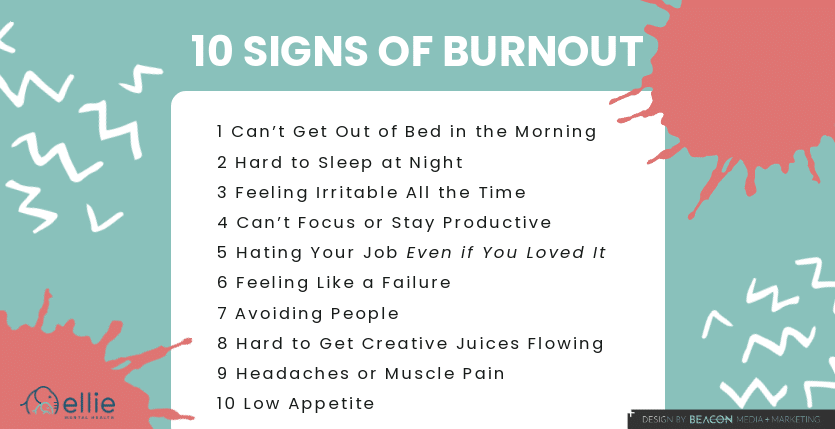Let’s be real for a moment: Being a person can be exhausting. As humans, we carry a lot on our shoulders and don’t always give our bodies and minds the rest they need to recharge. If you’re constantly spinning your wheels and feel like each day is a race against the clock to get as much checked off your to-do list as possible, you’re bound to reach your limits at some point.
That’s when burnout happens – when your wheels simply won’t spin no matter how hard you try to get them going. If you feel the effects of chronic stress and exhaustion affecting your performance or motivation at work, it’s time to check in with yourself. Here are ten common signs of burnout to look out for and tips on how to refresh, reset, and take care of your mental health during this time.
Tired of feeling beyond tired? We get it – burnout sucks! Call Ellie Mental Health and get matched with a therapist near you.
What Causes Burnout in the First Place?
Burnout is incredibly common, and the COVID-19 pandemic definitely didn’t help the issue. In Indeed’s 2021 Employee Burnout Report, 52% of survey respondents claimed they experienced burnout in the previous year. This was a jump up from pre-COVID survey results, where 43% of participants reported burnout. And from the different age groups surveyed, millennials topped the charts every time in feeling the most burned out.
While burnout is a not medical condition, it can be closely linked to mental health conditions, such as depression, anxiety, or stress. It’s been recognized as an “occupational phenomenon” by the World Health Organization (WHO) and is described as being caused by “chronic workplace stress that has not been successfully managed.”
The Link Between Stress and Burnout
Workplace stress is one of the most common causes of burnout. Maybe you feel a constant need to perform your best. Maybe you feel a massive amount of responsibility, consistently deal with angry customers, or always have a loaded plate. If every day feels stressful, it’s likely that a bad case of burnout is around the corner – whether you’re a working professional, college student, or a stay-at-home parent.
If stress is feeling overwhelmed and having too much energy or emotion, then burnout is the opposite. It’s feeling unmotivated, detached, and empty. The transition from stress to burnout doesn’t happen overnight. You might not realize that you’ve crossed that threshold until you’re deep in it.
The 10 Signs of Burnout

1. You Can’t Get Out of Bed in the Morning
Everyone has those mornings where they can’t stop hitting the snooze button. However, feeling fatigued from the moment you wake up is a major sign of burnout.
2. You Can’t Sleep at Night
On the flip side, burnout can cause insomnia. You might find yourself playing through the endless list of tasks that need to get done instead of sleeping.
3. You Feel Irritable All the Time
Burnout can leave you restless, heated, and constantly on the verge of exploding. This irritability will likely follow you from work to home, which can have a negative effect on your relationships.
4. You Can’t Focus or Stay Productive
No matter how hard you try, you just can’t stay focused. A task that would normally take you 30 minutes can stretch to hours because you can’t find the motivation to begin or quickly get off task. Or maybe work keeps falling through the cracks. Missing a deadline or two might not be a big deal. But if you’re consistently struggling to get your work done and can’t seem to make any of your deadlines, burnout might be to blame.
5. You Hate Your Job (Even If You Loved It)
If you dread going to work each day, that’s a major red flag that you’re feeling burned out. On one hand, it’s possible that you work in a toxic environment and that your energy is best spent elsewhere. However, you can get burnout working at a place you love. Even if you have the best coworkers and landed your dream job, burnout can make every workday feel like a challenge.
6. You Feel Like a Failure
Burnout and shame are close friends. If you feel unsuccessful and underappreciated at work, that can lead you to feeling burned out in the first place. You might feel ashamed that you can’t just “get it together” and do your work.
7. You’ve Been Avoiding People
Burnout can lead to self-isolation. You might feel too overwhelmed to socialize with your coworkers during the day and you might even feel too exhausted to spend time with your friends or family outside of work.
8. You Can’t Get the Creative Juices Flowing
Feeling like you’re in a permanent state of writer’s block? Burnout can make you feel like all your creative juices have suddenly gone dry, and not even the normal walk around the block or cup of tea can get you back in the groove.
9. You Keep Getting Headaches or Muscle Pain
Burnout can take a toll on your physical health, making you more susceptible to sickness. It’s also common for stress to cause chronic headaches or muscle pain.
10. Your Appetite Is Low
Notice that you’re skipping breakfast most days or that you just don’t feel hungry when lunch comes around? Burnout can cause your appetite to take a dip and you might even start to unintentionally lose weight.
How To Recover From Burnout for Good
Hustle culture is a real thing, and it can be incredibly toxic to your mental health. If notice yourself struggling to get through the workday, the solution isn’t to just push harder and make it happen. Burnout doesn’t just affect your satisfaction with work. It can disrupt your home life, your relationships, your health, and your hobbies. If you constantly feel like an empty well, you’ll struggle to muster the energy to clean the house, keep up on bills, spend time with your kids, exercise, or cook healthy meals.
Recovering from burnout and preventing it from coming back involves more than taking an impromptu vacation or adding a self-care routine to your checklist. While a stressful work environment is a major part of what causes burnout, your attitudes about work, your perceptions about yourself, and the way you relate with others all play roles.
The good news is that you can fight chronic stress at work and in other aspects of your life. By finding balance and learning a few essential skills, you can find satisfaction and peace. You can finally feel like you have the energy and capacity to not only get through the workday but to also spend quality time with your loved ones and pursue things you enjoy.
Here are a few key ways to establish a healthy relationship with your work and recover from a bad case of burnout:
- Talk it out: Feeling burned out can be a scary feeling. If burnout is affecting your work performance, you might even fear that you’ll lose your job. Some people have a tendency to internalize their stress, but staying silent can make you feel alone and helpless. Venting to someone you trust and admitting out loud that you can’t do it all can feel like a huge weight off your shoulders.
- Identify the Root Cause: While stress is what leads to burnout, you need to identify what is causing your dissatisfaction and stress at work. Are you taking on more than you can handle? Are you balancing work with a tumultuous relationship or mental health issue? Do you feel unrecognized for your achievements or feel isolated from your coworkers? Take time to self-reflect and pin down what factors might be triggering burnout.
- Set Firm Boundaries: Your time is precious, and you need to divvy it up smartly. If you say yes to everything that people ask you to do, you’ll either fail in doing everything you promised or end up burned out at the end of it all. It’s okay to say no and be picky about what you add to your schedule.
- Check-in on Yourself Often: If you’re always on the go, you might get so lost in day-to-day activities that you don’t realize you are burned out until it hits you in full force. Make a point to self-evaluate your mental health and look for the warning signs that you need to reset.
- Rediscover Your Hobbies: Make time for things you enjoy in your weekly schedule. Not every minute of your day needs to be spent on completing a task or getting something done. High achievers tend to get caught in loops of always working. Whether that’s putting hours in at your job or getting through the piles of laundry that accumulated over the week.
When To See a Therapist for Burnout
Burnout sucks, and it can last a long time. You might feel like you’ve done everything you can to beat it, but no matter how hard you try, you just can’t get your vigor and motivation back. Therapy can make a big difference in helping you reclaim your life. Your therapist can help you identify the root cause of your burnout and work with you on effective ways to minimize stress and find a healthy balance in your work life.
Is burnout stealing your productivity? Speak with an Ellie specialist and get matched with a local provider today!


